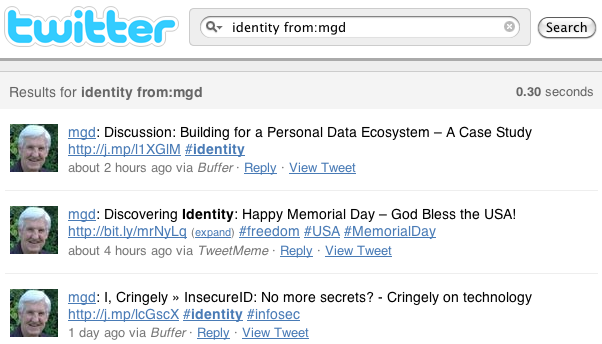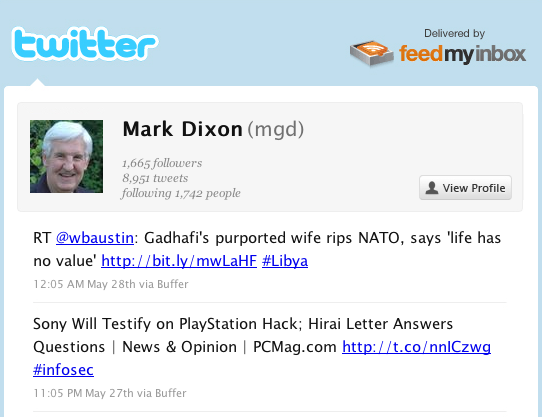Facebook or Twitter: Friend or Stalker?
From the Geek & Poke archives … if she won’t friend you on Facebook, you can follow her on Twitter.
Isn’t that stalking?

From the Geek & Poke archives … if she won’t friend you on Facebook, you can follow her on Twitter.
Isn’t that stalking?
 On June 9th, the Federal Communications Commission issued  an interesting document, “The Information Needs of Communities – The Changing Media Landscape In A Broadband Age,” authored by Steven Waldman and The Working Group On Information Needs Of Communities.  (A two-page summary of the document is available here.)
On June 9th, the Federal Communications Commission issued  an interesting document, “The Information Needs of Communities – The Changing Media Landscape In A Broadband Age,” authored by Steven Waldman and The Working Group On Information Needs Of Communities.  (A two-page summary of the document is available here.)
The document introduction states:
In culmination of its work over the last year, the FCC Working Group on the Information Needs of Communities delivered a report on June 9, 2011 addressing the rapidly changing media landscape in a broadband age. In 2009, a bipartisan Knight Commission found that while the broadband age is enabling an information and communications renaissance, local communities in particular are being unevenly served with critical information about local issues.
Soon after the Knight Commission delivered its findings, the FCC initiated a staff-level working group to identify crosscurrent and trend, and make recommendations on how the information needs of communities can be met in a broadband world.
I enjoyed reading the statement by FCCÂ Commissioner Michael J. Copps that accompanied the document’s release; here are a few excerpts:
Let’s begin with a basic truth: the future of our country’s media is an issue that goes to the heart of our democracy. A well-informed electorate is the premise and prerequisite of functioning self-government. To make this compact work, it is imperative that the FCC play a vital role in helping to ensure that all Americans have access to diverse and competing news and information that provide the grist for democracy’s churning mill.
…
The Digital Age holds amazing promise for expanding the scope of our democratic discourse. The Staff Report recognizes this and the present Commission has focused tremendous energy on both broadband deployment and adoption. But let’s recognize up-front that building a new town-square paved with broadband bricks and stacked with good news and information is not going to happen on auto-pilot.
…
An open Internet is not the entire solution for robust Twenty-first century journalism. It’s tougher than that, and I, for one, don’t believe we’ll get there absent some positive public policy solutions. We have never had successful dissemination of news and information in this country without some encouraging public policy guidance, going back to the earliest days of the young republic when Washington, Madison and Jefferson saw to it that newspaper were financially able to reach readers all across the fledgling young republic.
…
These issues mean a lot to me because I believe they mean a lot to our country. I have been outspoken about them–and sometimes blunt, I know. I intend to keep speaking out on them in the months and, if needed, the years ahead. This nation faces  stark and threatening challenges to the leadership that brought us and the world successfully through so many dire threats in the century just past. Now we confront fundamental new uncertainties about the revival of our economy, where new jobs will come from, how we will prosper in a hyper-competitive global arena, how to support the kind of education that our kids and grandkids will need to thrive–indeed to survive–in this difficult time, how to open the doors of opportunity to every American, no matter who they are, where they live, or the particular circumstances of their individual lives.We’ve got a lot to get on top of as a country and if we don’t have the facts, don’t have the information, and don’t have the news about what’s going on in the neighborhood and the town and the nation and world around us, our future will be vastly diminished. That’s why so much rides on the future of what we are talking about today.
I think these are valuable objectives, but it isn’t clear where this document will lead. Â One author commented, “FCC Report on Media Offers Strong Diagnosis, Weak Prescriptions.”
I personally feel sensitive to this changing landscape. Â I love the innovation of the USA Today and Wall Street Journal iPad apps, but I still enjoy reading the local paper-based newspaper over breakfast. Â But my favorite local newspaper went out of business a couple of years ago, and the surviving newspaper is steadily shrinking in size. Â This local newspaper’s online presence falls far short of the USA Today/WSJ readability model. Â It will be interesting to see how this all plays out.
To start with, I think I’ll transfer the whole 465-page report to my iPad and read it there.
PS. Â I think the FCC has an ugly logo. Â That’s all.
I was intrigued by a headline I read this morning, “How Facebook Can Put Google Out of Business,” by Ben Elowitz (@elowitz), co-founder and CEO of Wetpaint.
Elowitz started by stating his admiration for Google:
I used to envy Google and the vast digital empire that Schmidt commanded. Â Google had one of the most intricate monopolies of all time. It had the most impressive dataset the world had ever seen; the most sophisticated algorithm to make sense of it; an audience of a billion users expressing their interest; and more than a million advertisers bidding furiously to reach those consumers at just the right moment.
What’s more, it had captured the ultimate prize: increasing returns to scale. Only Google could spread such huge R&D costs among an even more humongous query volume, all while offering advertisers the chance to reach most of the population with one buy. Google had earned its success.
However, he as concluded that Facebook offers more inherent value than Google, and can beat Google at its own game:
While Google has amassed an incredible database consisting of the fossilized linkages between most Web pages on the planet, Facebook possesses an asset that’s far more valuable—the realtime linkages between real people and the Web.What does this mean, and what are the implications here?
Well, in a nutshell, Facebook has stored a treasure trove of distinctive data that, if fully utilized, could put Google out of business.
I’m not astute enough to predict whether Facebook or Google will win, but I believe Elowitz has identified an important distinction between the inherent value of linkages:
“linkages between real people and the Web” [and, I might add, linkages between real people] – Â primary Facebook value
or
“linkages between Web pages” – primary Google value
 We call linkages between people “relationships”. In my previous post, each line on my LinkedIn connection map represents a real life relationship. Some of my Linkedin relationships are closer in real life than others, just like some of my Facebook “friendships” are closer than others. Â But they are real. Â They do exist.
We call linkages between people “relationships”. In my previous post, each line on my LinkedIn connection map represents a real life relationship. Some of my Linkedin relationships are closer in real life than others, just like some of my Facebook “friendships” are closer than others. Â But they are real. Â They do exist.
My real-life relationships represented by Facebook or LinkedIn have inherent value to me. Â Both Facebook and LinkedIn provide real value to me through the services they provide.
Google has proven that there is great business value in “linkages between web pages”. Â I believe companies like Facebook and LinkedIn are beginning to how to business value can be derived from “linkages between people”. Â Google is clearly trying to catch up in the relationships business, where Eric Schmidt admits they have failed.
It will be interesting to see how they, and other companies of their ilk, will continue to succeed for fail in business as they leverage (in a positive sense) their understanding of my relationships, hopefully without exploiting (in a negative sense), the private information I entrust to them.
Journal: a daily record, as of occurrences, experiences, or observations.
One could easily argue that what a person tweets is a reflection of his or her current state of mind. Whether it be direct comments, forwarded links or retweets, these micromessages are on extension of what a person is thinking at that particular time.
I do a couple of things to use my daily tweets as s sort of personal journal or record of my “occurences, experiences or observations.”
First, I try to use hash tags in the majority of my tweets, so it is easy to retrieve and review my tweets stream for a particular subject using Twitter advanced search capability:

Second, I use the FeedMyInbox service to authomatically send a compilation of my dailty tweet stream to Evernote, where I can search on terms and easily find what I have been tweeting about on a daily basis.

So far, I have 613 entries in my Evernote journal folder, dating back to Christmas day, 2009. That is about twices as many entries as I have in my “official” journal. But history is being recorded – in brief 140 character chunks.
Poor Dilbert. His social skills just don’t measure up to the smartphone!
On a more serious note, is this so far removed from reality? Is the entertainment value of smartphones and related apps getting in the way of real human relationships?
Jeremy Duncan seems to be addicted. Are you?

I thing my family would rather have a full-scale electrical blackout that an Internet interruption.
Thanks to @JeffCutler for pointing out mentionmap, a service provided by Asterisq, to build a “map of mentions†where “each user is connected to the people and hashtags they mentioned the most in recent tweets.â€
Here is my current map. It will be interesting to check again in a few days to see who I am connected to then.
We are finally getting insight into the real purposes of social media, thanks to Wiley Miller’s Non Sequitur:
I recently stumbled across an interesting site, Klout.com, which analyzes a Twitter account’s history and assigns a “Klout Score,†which is purported to be a “measurement of your overall online influence.
Of course, my inquisitive nature as it is, I had to try it for my Twitter account, @mgd. The results were not great, but respectable, I suppose:
By contrast, the Klout Score of my favorite Phoenix Suns tweeter, Jared Dudley, was 70.
The three major components of the score are:
Additionally, Klout offered a categorization for my twitter account.
I am certainly not a celebrity, but I do try to be consistent and focused. I have a small number of followers who seem to be fairly well engaged.
For example, after I had received my Klout store, I joked on Twitter,
“Let’s hope that low @Klout doesn’t mean low worth.â€
An “engaged†Twitter follower responded with this encouraging note:
“@mgd I’m sure our worth as human beings is not related to Klout. :)â€
That was certainly good news. I am glad that my intrinsic worth really isn’t dependent on my Twitter Klout score. I was reminded of the profound observation printed on a framed picture my wife gave me many years ago:
“In a hundred years from now it will not matter what my bank account was, the type of house I lived in, or the kind of clothes I wore. But the world may be much different, because I was important in the life of a child.â€
The bottom line? Klout is interesting, but has little to do with my value as a human being and the impact I can make on things that really matter.